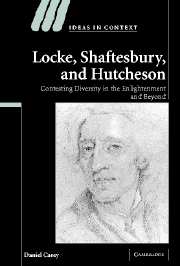Book contents
- Frontmatter
- Contents
- Acknowledgements
- Abbreviations
- Introduction
- 1 Locke, diversity, and the natural history of man
- 2 The uses of diversity: Locke's sceptical critique of Stoicism
- 3 Locke's anthropology: travel, innateness, and the exercise of reason
- 4 Contesting diversity: Shaftesbury's reply to Locke
- 5 Method, moral sense, and the problem of diversity: Francis Hutcheson and the Scottish Enlightenment
- 6 Conclusion: the future of diversity
- Bibliography
- Index
3 - Locke's anthropology: travel, innateness, and the exercise of reason
Published online by Cambridge University Press: 22 September 2009
- Frontmatter
- Contents
- Acknowledgements
- Abbreviations
- Introduction
- 1 Locke, diversity, and the natural history of man
- 2 The uses of diversity: Locke's sceptical critique of Stoicism
- 3 Locke's anthropology: travel, innateness, and the exercise of reason
- 4 Contesting diversity: Shaftesbury's reply to Locke
- 5 Method, moral sense, and the problem of diversity: Francis Hutcheson and the Scottish Enlightenment
- 6 Conclusion: the future of diversity
- Bibliography
- Index
Summary
Locke's strategy against innateness led him to point out the existence of widespread cultural diversity, which he refused to write off as degeneracy caused by education or the results of the Fall. We can trace Locke's engagement with the phenomenon of difference to two principal sources. In the first instance, his way of approaching human nature through a study of customs and manners was indebted to the methodology of natural history. This approach emphasised the accumulation of evidence on a probabilistic basis without assuming a knowledge of essences in advance. From the perspective of such a natural history, Locke refuted the claim of innate ideas or principles by treating their existence as an empirical question, a matter of fact subject to determination through historical research.
Locke's second source of inspiration had a sceptical pedigree. The sceptics, both ancient and early modern, made use of diversity to attack Stoic assertions about human uniformity, common consent, and internal principles or prolepses concerning virtue and the divine. Locke made use of cultural variation not in order to create doubt about morals or the existence of God, but rather to undermine dogmatic attachment to the false belief in innate ideas or principles. In his formal treatment of the problem in the Essay, Locke argued that proponents of innate principles or ideas needed to establish universal agreement. Such consent was a necessary condition for their position to stand. Cultural diversity, of the kind introduced by sceptics, served the purpose of refuting it.
- Type
- Chapter
- Information
- Locke, Shaftesbury, and HutchesonContesting Diversity in the Enlightenment and Beyond, pp. 69 - 97Publisher: Cambridge University PressPrint publication year: 2006

